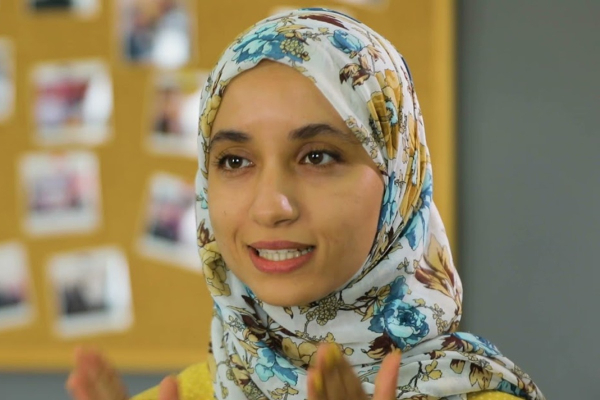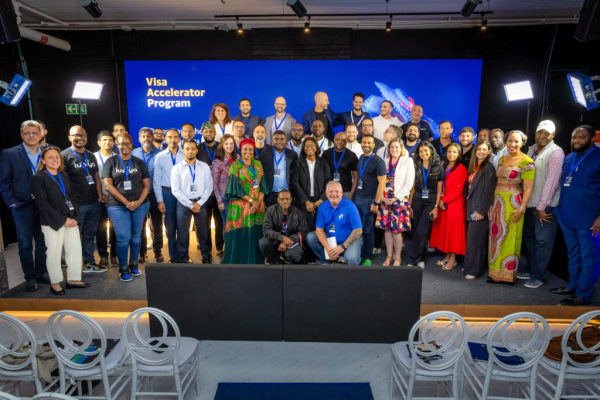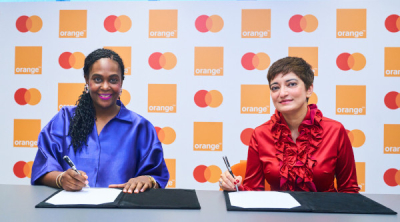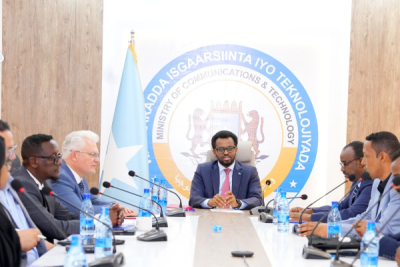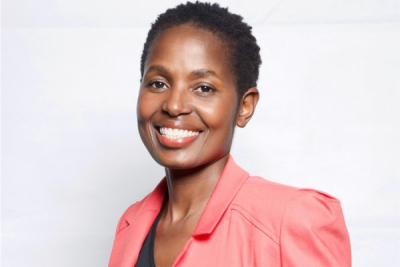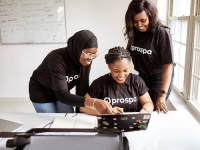Khaoula Ben Ahmed uses innovation to promote independence. Through her company, she merges technology and design to improve daily life for people with disabilities.
Ben Ahmed is a Tunisian entrepreneur and engineer. She co-founded and leads GEWINNER, a company that builds mobility solutions for people facing physical challenges.
She started GEWINNER in 2019 with Ghofrane Ayari, Souleima Ben Temime, and Sirine Ayari. The team develops advanced products using artificial intelligence, electronic design, and ergonomic principles. GEWINNER aims to boost autonomy and quality of life for people with limited mobility by putting cutting-edge technology to work.
The company’s top product, MOOVOBRAIN, marks a breakthrough in Tunisia’s medical equipment sector. MOOVOBRAIN is an intelligent control system installed in standard electric wheelchairs. It lets users steer their chairs using brain signals or eye movements, thanks to electroencephalogram (EEG) and eye-tracking technologies. This system gives new options to people with severe mobility challenges.
The device offers multiple control modes. Users can guide their wheelchairs with facial expressions—like smiles, blinks, or head movements—or by voice command. It also retains classic joystick controls for those who prefer traditional use. All system features operate through a dedicated mobile app, granting remote access to technical support, product customization, and maintenance.
Ben Ahmed’s journey began at the University of Tunis El Manar, where she earned a bachelor’s degree in biomedical engineering in 2017. She completed a master’s in research, biophysics, radiophysics, and medical imaging at the Higher Institute of Medical Technologies of Tunis in 2019. In 2021, she added a master’s in innovation management from Carthage Business School.
Her work has won major recognition. In 2021, Managers and Huawei named her Female Entrepreneur of the Year in technology. In 2024, she and her team secured third place in the Young Inventors Prize from the European Patent Office’s European Inventor Award.
This article was initially published in French by Melchior Koba
Edited in English by Ange Jason Quenum
Visa has announced the launch of applications for its Africa 2025 Accelerator, designed to empower startups building the next generation of financial services across the continent.
The program is open to seed to Series A startups that have a functional MVP or market-ready product and are either based in Africa or planning to expand within the region.
Participants will receive tailored 1:1 mentorship from experienced founders and industry leaders, offering practical insights and hands-on guidance. Startups will also gain access to over US$200,000 in partner credits and service discounts, significantly reducing operational costs and accelerating growth.
Application closes August 15.
By tailoring connectivity and financial inclusion services to local realities, Orange helps reduce digital and social divides, laying the groundwork for sustainable and inclusive development.
Orange Money processed 9 billion transactions valued at €164 billion ($190.37 billion), including €6 billion ($6.96 billion) in international transfers, in its African markets in 2024. This was revealed in the Cultivating Impact: Orange Middle East & Africa 2024 Corporate Social Responsibility Report. The platform welcomed 14 million new users, bringing its total to 100 million registered accounts since the service was launched, with 40 million active every month.
At the heart of this success lies a vast and expanding network of 600,000 points of sale, 66,000 of which were opened just last year. These points of sale serve as vital social hubs and income sources, empowering local agents and supporting micro-enterprises.
Orange Money’s reach was especially strong in key markets across Africa. The Democratic Republic of Congo led with 128,400 points of sale, followed by Cameroon with 92,400, Mali with 71,500, Côte d’Ivoire with 66,400, and Guinea with 64,400, the report reveals. A significant share of active customers are women, highlighting the program’s commitment to inclusivity. In Madagascar, for instance, 50% of active Orange Money users are women.
But Orange Money isn’t stopping at transfers. It expanded its fintech offerings via Orange Bank Africa and partnerships in countries without local banking presence—Botswana, Madagascar, among others—unlocking microcredit options like Tik Tak loans (In 2024, more than 340,000 customers were granted a Tik Tak loan). Mobile micro-insurance is another service supporting Orange Money's growth. Orange reveals that mobile micro-insurance solutions are already available in Sierra Leone, Côte d'Ivoire, Senegal, the DRC, and Mali.
In 2024, the platform pushed forward merchant digitalization by equipping hundreds of thousands of informal vendors with QR codes and Orange Money wallets, improving payment security and enabling transaction traceability.
Its impact extends further through mass payment solutions delivered in partnership with organizations such as the Danish Refugee Council, FAO, and WFP. These partnerships have enabled the rapid distribution of funds to vulnerable households, providing timely and efficient support when needed most.
In Liberia, it supports the government's digital payment initiative and works closely with the Central Bank to drive financial inclusion. In Côte d’Ivoire, Orange Money has helped over 400,000 households receive semi-annual social safety net payments, strengthening social protection mechanisms.
Looking ahead, a partnership signed at the end of 2024 with Mastercard will allow users in seven countries—from Senegal to Sierra Leone—to access virtual and physical debit cards, directly linked to their Orange Money accounts for seamless domestic and international payments.
All of this reinforces Orange’s wider mission to build a robust digital ecosystem tailored to local needs while supporting innovation and job creation. Across the 17 countries where Orange operates, the company serves 161 million customers, including 100 million data users and over 83 million 4G customers. As of 2024, mobile broadband coverage has reached 77%, with a goal of expanding to 85% by 2025.
With Africa’s digital economy projected to hit $712 billion by 2050 (according to the International Finance Corporation), platforms like Orange Money are stepping up investment and diversifying their value proposition to build customer loyalty, win new users, and boost revenues.
Hikmatu Bilali
Highlights:
- Somalia and UNDP signed an MoU to support digital governance and public service innovation.
- The deal aims to boost human capital, e-government infrastructure, and digital inclusion.
- Somalia ranks near bottom in global digital and cybersecurity indices.
Somalia has signed a memorandum of understanding with the United Nations Development Programme (UNDP) to accelerate its national digital transformation agenda. The agreement was inked on Wednesday, July 16, in Mogadishu and aims to enhance cooperation in digital governance, innovation, public service delivery, and human capital development.
Lionel Laurens, UNDP’s resident representative in Somalia, said the MoU would serve as a framework for strengthening Somalia’s digital infrastructure and inclusion strategy, particularly in areas such as e-governance and capacity building.
The move is part of a broader international outreach by the Somali government to close its digital gap and promote socio-economic development. Earlier this month, Somali officials reiterated their commitment to international collaboration during a high-level meeting in Switzerland, holding talks with representatives from the International Telecommunication Union (ITU), Malaysia, Saudi Arabia, and Djibouti.
Topics under discussion included youth digital skills development, telecommunications infrastructure, governance, cybersecurity, and investment in emerging technologies.
Somalia remains one of the world’s least digitally developed countries. According to the UN’s 2024 E-Government Development Index, Somalia ranks 191 out of 193, with a score of just 0.1468—far below the African average of 0.4247. In the 2024 Global Cybersecurity Index by the ITU, Somalia is placed at level 4 out of 5 with a score of 37.38 out of 100, underscoring the country’s significant technical and regulatory challenges.
Laurens reaffirmed UNDP’s support for the Somali federal government and emphasized the role of the Ministry of Telecommunications as a key driver of the nation’s digital transition. However, he noted that this is only an initial framework agreement, and its practical outcomes will depend on subsequent implementation steps.
This article was initially published in French by Isaac K. Kassouwi.
Edited in English by Ola Schad Akinocho.
- Gabon’s government launched Missamou, its first virtual assistant chatbot, to modernise state-citizen communication.
- Missamou uses natural language processing to provide round-the-clock official information and public services via Facebook Messenger.
- This move reflects Gabon’s push for digital inclusion and follows similar AI initiatives in African countries like Benin.
Governments worldwide are increasingly turning to chatbots to modernize public communication and improve citizens’ access to information. This growing trend reflects a broader push for more direct, interactive, and continuous engagement between the state and the public.
On July 15, the Gabonese government unveiled Missamou, a virtual assistant available through Facebook Messenger. Described as the country's first government chatbot, Missamou allows users to ask questions, check official news, access public services, and obtain information about administrative procedures—anytime, anywhere.
Built using natural language processing (NLP), Missamou can understand everyday speech and deliver real-time responses from verified government sources. The system is designed to ease the burden on traditional services like call centres and in-person offices.
This initiative is part of Gabon’s broader digital transformation agenda, which promotes transparency, open data, and digital inclusion. By launching Missamou on Facebook Messenger, a widely used platform among the youth, the government hopes to ensure high user engagement and widespread adoption.
With the launch of Missamou, Gabon seeks to enhance the distribution of official information, streamline access to public services, and encourage greater citizen engagement. This effort aligns with a broader regional movement toward digital innovation in governance.
In 2023, Benin introduced GPT-BJ, a sophisticated conversational assistant designed to respond to complex inquiries regarding key legal frameworks such as the General Tax Code, Labour Code, Digital Code, and Penal Code. Created by the Agence des Systèmes d'Information et du Numérique (ASIN), GPT-BJ has been recognized as a pioneering tool for improving legal accessibility and promoting transparent governance.
By adopting similar AI-driven solutions, Gabon is positioning itself alongside regional leaders in leveraging technology for more connected, responsive, and citizen-focused government services.
This article was initially published in French by Samira Njoya
Edited in English by Ange Jason Quenum
South African entrepreneur Sifiso Danisa has turned her attention to a field often overlooked: teaching African languages to children. Through Limu Lab, the edtech start-up she co-founded with Sphumelele Sibeko in 2020, Danisa is working to bridge the cultural and educational gap that leaves many African children disconnected from their mother tongues.
As CEO of Limu Lab, Danisa leads a company that blends technology with tradition. The platform uses animation, music, gamification, and storytelling to make the learning of African languages fun, modern, and accessible. The inspiration came from Danisa’s own frustration with the lack of digital resources in African vernacular languages.
Limu Lab’s name—drawn from Nguni and Swahili, where “Limu” means “language”—reflects its core mission: to preserve and pass on Africa’s rich linguistic heritage to the next generation through innovative tools designed for early education.
Limu Lab has developed a mobile app available on both iOS and Android, designed to make language learning immersive and fun for children. The app features a rich variety of interactive content—animated stories, educational games, karaoke, e-books, songs, and hands-on crafts. A standout feature is its universe of African characters, presented through short films and educational adventures that help children see themselves reflected in what they learn.
The platform currently offers content in English, Afrikaans, isiZulu, and Sesotho, with more African languages being added regularly to expand its reach across the continent.
Sifiso Danisa, the driving force behind Limu Lab, holds a Bachelor of Commerce degree from the University of South Africa (2003) and earned her MBA from GIBS Business School in 2020. She began her career at global logistics giant A.P. Moller - Maersk, where she rose through the ranks from Account Manager to Customer Services Team Leader and Process Improvement Specialist before leaving in 2014.
This article was initially published in French by Melchior Koba
Edited in English by Ange Jason Quenum
Hypertension is among the most prevalent chronic diseases worldwide. In Kenya, three tech entrepreneurs have launched a digital solution to help individuals better manage the condition.
Vitali Health, a digital health platform developed by a Kenyan startup, allows users, especially those with hypertension, to access primary healthcare services. Marita Lilonde, Nzivo Katoo, and Esther Mueni founded the Nairobi-based healthtech company in 2024.
"Hypertension is a leading risk factor for cardiovascular diseases, yet traditional management relies heavily on medication rather than addressing underlying lifestyle factors," the startup explained. "At Vitali Health, we aim to bridge this gap by offering a digital-first, lifestyle-based approach that empowers individuals to take control of their health."
Vitali Health provides an integrated solution. Patients can consult with doctors, securely store and share their medical data, and receive regular monitoring of vital signs. Its mobile app enables hypertension patients to schedule medical appointments, receive medication reminders, and share results with licensed healthcare professionals.
"Our platform leverages AI-driven recommendations, real-time health tracking, and expert consultations to provide personalized solutions tailored to each user’s unique needs," the healthtech company stated. Care providers also gain access to a dashboard, allowing them to track case progress, customize treatments, and offer better long-term support. This approach enhances the proactive management of hypertension.
Already operating in several urban and peri-urban areas of Kenya, Vitali Health helps bridge gaps in the primary healthcare system, particularly in chronic disease follow-up. By focusing on continuity of care, patient education, and the use of medical data, the startup offers an innovative response to a major public health challenge.
Adoni Conrad Quenum
Identifying a major challenge for African small businesses in accessing financing, he founded pumpkn.io. This platform provides a concrete alternative to traditional systems by rethinking credit criteria to better support the continent's entrepreneurs.
Zaheer Dindar (photo), a South African entrepreneur, is the co-founder and CEO of pumpkn.io, a fintech company providing innovative financing solutions for small businesses and agro-entrepreneurs in Africa.
Dindar launched pumpkn.io in Johannesburg in 2022 with Jérôme van Innis and Fazlur Pandor. The company aims to address the financing gap, a significant barrier to growth for many small and medium-sized enterprises in Africa's agricultural and agri-food sectors.
The digital platform developed by pumpkn.io leverages artificial intelligence and a risk assessment model based on clients' specific business data, moving beyond traditional banking criteria. This approach allows the company to accelerate financing decisions, reduce administrative paperwork, and offer direct access to credit without requiring collateral, which is often unattainable for many entrepreneurs in the sector.
Pumpkn.io's innovation also includes its "Funding Ladder" concept. This system enables entrepreneurs to initially access small amounts of financing. Through regular repayments, they can gradually increase borrowed amounts and loan durations. This model supports business growth with a progressive approach tailored to each company's development.
Before co-founding pumpkn.io, Dindar launched Equipedia in 2010, a platform focused on educating subsistence farmers. He holds a bachelor's degree in computational and applied mathematics from the University of the Witwatersrand, earned in 2003, and a master's degree in artificial intelligence from the same university in 2004.
His professional career began in 2007 as a research associate at AB Bernstein, a financial firm. In 2011, he became director of FeverTree Consulting, a South African business advisory company. Five years later, in 2016, he was appointed project manager at Landbank, South Africa's public agricultural bank. From 2020 to 2022, Dindar served as managing partner at BeyondSoil, a South Africa-based management consulting firm.
Melchior Koba
- Fintech offers loans, payments, and business tools via its mobile app
- Platform helps formalize operations for small and informal businesses
- Over 150,000 Nigerian firms have used Prospa's services since launch
Prospa, a Nigerian fintech start-up, is helping small businesses access funding and manage daily operations through a mobile platform that combines banking, accounting, and business tools. Founded in 2019 by Frederik Obasi, Rodney Jackson-Cole, and Chioma Ugo, the Lagos-based company is focused on supporting micro, small, and medium-sized enterprises (MSMEs) in a market where formal financial services remain limited.
“Many MSMEs in Nigeria lack access to formal banking and business tools. They mix personal and business finances using cash, spreadsheets, WhatsApp, or paper logs, which causes inefficiencies, missed opportunities, and a lack of credit history,” said Frederik Obasi.
Available on both iOS and Android, the Prospa app has already been downloaded over a thousand times, according to the Google Play Store. Once users create an account, they gain access to a suite of features including business accounts, invoicing, expense tracking, and short-term loans, all from within the app.
One of Prospa’s strengths is its ability to provide a complete financial overview of a business. By combining transaction data, business history, and payment behavior, the app helps entrepreneurs build a clearer case for loan applications. This data-driven approach lowers perceived lending risk and allows faster access to credit, often in under 24 hours.
The platform serves both informal businesses and more structured enterprises. According to the company, it has already supported over 150,000 businesses by offering tailored financial tools that go far beyond traditional digital banking.
Combining a passion for music and innovation with extensive production expertise, he is a dedicated contributor to the African music industry. Through Baziks, he actively structures and shapes the Congolese music landscape.
Baya Ciamala, a Congolese entrepreneur, radio host, and producer, is the founder and president of Baziks, a music streaming application dedicated to Congolese and African music.
Baziks, initially conceived as a brand and blog in 2016 and officially registered in 2019, swiftly evolved into a startup with a clear mission. Its goal is to provide independent artists with a platform to share and directly monetize their work, circumventing traditional music industry channels. The platform aims to empower African musicians and creators to distribute and sell their digital works directly to both local and international audiences.
Baziks offers a streaming solution entirely focused on Central African music, with particular emphasis on Congolese creativity. The platform seeks to boost the visibility of African music while protecting artists against piracy, leveraging locally developed technology. This model also aims to structure the music ecosystem in the Democratic Republic of Congo (DRC) by improving music access and ensuring fair compensation for creators.
The platform allows artists to manage their content, choose between streaming or direct downloads, and connect with their audience without intermediaries. This direct-to-fan model is built on the principle that artists should retain a significant share of the revenue generated by their work.
Each year, Baziks organizes the Baziks Digital Music Conference, an event that convenes industry experts, artists, producers, and institutional partners to strengthen ties within the music industry. In addition to this conference, the startup supports the local scene through concerts and cultural events. It also offers editorial content, crowdfunding campaigns, and digital ticketing services.
Baya Ciamala holds a degree in radio production, obtained in 2002 from the Congolese Institute of Audiovisual Media. He also earned a diploma in artistic management and project development in 2007 from the AMI Centre for the Development of Contemporary Music in France.
His professional career began in 1999 at Raga Media Sprl in Kinshasa, DRC, where he worked as a radio and TV host and producer. In 2006, he became head of the media’s radio department. From January 2011 to June 2025, he served as a public information assistant at the United Nations Mission in Congo.
Thanks to his startup Baziks, Baya Ciamala has received multiple accolades. He was the winner of the Digital Lab Africa Online Music Prize in 2016, the 1000 Entrepreneurs Prize at the Africa–France Summit in 2020, and the Orange Social Entrepreneur Award (POESAM) in DRC in 2021.
Melchior Koba
More...
- The CNASS has partnered with the State Digital Agency to digitize the national health insurance system
- The agreement targets improved infrastructure, service quality, and digital inclusion for underserved populations
- It supports CNASS’s 2025–2030 strategy to expand coverage, enhance transparency, and better serve vulnerable groups
Mauritania's Caisse Nationale de Solidarité en Santé (CNASS), a voluntary health insurance scheme with a social mission, announced on Tuesday, July 15, the signing of a cooperation agreement with the State Digital Agency (AN-ETAT). This initiative marks the beginning of a partnership aimed at digitally transforming Mauritania's social protection system.
According to a CNASS press release, the agreement sets several concrete objectives. These include strengthening and securing CNASS's digital infrastructure, adopting modern solutions to improve service access and quality, and facilitating the sharing of technological expertise between the two institutions. The shared goal is to enhance digital inclusion, particularly for populations with limited exposure to digital tools.
This collaboration occurs amidst a broader national push to accelerate public service transformation. For CNASS, the agreement fully aligns with its upcoming 2025–2030 digitization strategy, which is currently under development. This strategy aims to improve service quality, enhance coordination with healthcare providers, ensure better tracking of benefits, and more effectively address the needs of vulnerable populations.
In Mauritania, CNASS plays a key role in the country’s social protection policy, particularly in expanding health coverage to informal sector workers. By partnering with AN-ETAT, the operational body responsible for implementing the national digital strategy, CNASS is taking a significant step toward more efficient, transparent, and interconnected management.
Ultimately, the partnership is expected to streamline services, improve data reliability, and strengthen transparency in health insurance administration. It also aims to enhance the user experience by facilitating remote access to benefits, while laying the foundation for a more inclusive, modern, and sustainable social protection system for all Mauritanians.
Samira Njoya
Ronny Kitio, a Cameroonian computer scientist, is using tech to shake up the African music industry. He created Colorfol, a digital platform that serves as a home for music, videos, and podcasts from Francophone Africa.
Kitio, who graduated in fundamental computer science from the University of Yaoundé 1, founded Colorfol in 2019. He launched it to respond to the specific needs of artists and fans in the region. The platform allows users to discover, stream, and legally buy African music, while giving independent artists visibility and fair income.
“Our goal is to create a user-friendly platform that responds to the specific needs of our markets in Francophone Africa,” Kitio said in 2024. “We want to encourage fans to buy music directly from the artists, thus offering instant monetization for them. We are committed to ensuring fair compensation by allocating 70% of revenues to the artists.”
Colorfol doesn’t stop at music. The platform also features video content, podcasts, and digital ticketing for concerts, showcases, and other cultural events. This positions Colorfol as a full-service hub for both fans and professionals in the African music ecosystem.
Before launching Colorfol, Kitio founded ColorTechnology in 2017, a tech company where he worked as CEO, analyst, and developer. He started his career in 2011 at EMEKA Distribution in Cameroon as a maintenance technician. In 2014, he joined Camtel as a network technician, then moved to Orca Cameroon in 2015 as IT manager.
Kitio’s innovation has earned international recognition. In 2019, he won a spot in the AYADALAB program organized by the French and Goethe Institutes. That same year, he was a finalist in the African Application Launchpad competition. In 2020, he won Best Francophone African Startup from the International Organisation of La Francophonie. In 2021, the French Institute awarded him the IFC Innovation Label.
This article was initially published in French by Melchior Koba
Edited in English by Ange Jason Quenum
-
Program recovered 43.5 tons of devices for repair, reuse, or recycling
-
28.5% of Orange's annual phone sales in the region were collected
-
Initiative supports affordable access to tech and reduces e-waste footprint
In 2024, Orange Middle East and Africa ramped up its circular economy efforts by collecting 284,000 used mobile phones, equal to 28.5% of its annual phone sales in the region. The data comes from the company’s 2024 Corporate Social Responsibility (CSR) Report, which outlines its push to reduce environmental impact while improving digital access.
Titled "Cultivating Impact", the report highlights the achievements of Orange’s “Re” program, which collected 43.5 tons of electronic waste for refurbishment or recycling.
The initiative was active in five countries, Côte d’Ivoire, Cameroon, Burkina Faso, Egypt, and Jordan, and is built on four pillars: collection, repair, refurbishment, and recycling. In West Africa, Orange partners with Ateliers du Bocage, a French social enterprise that specializes in managing used electronics. In Egypt and Jordan, the process is fully managed through the "Re" program.
Phones in working condition are restored and sold at lower prices. In Egypt, more than 10% of devices sold by Orange in 2024 were refurbished units. The program also operates in Senegal and Morocco, where demand for affordable refurbished devices is rising fast. Irreparable phones are dismantled, and components are processed through certified recycling channels following environmental standards.
The circular model also applies to internet boxes. In 2024, Orange collected 172,000 boxes, of which 115,000 were refurbished. This helped avoid 2,800 tons of CO₂ emissions, which Orange says equals the emissions from 150 car trips around the African continent.
Orange has also launched public awareness campaigns and expanded its network of collection points — especially in Côte d’Ivoire, Egypt, and Jordan — to encourage more returns. The goal is twofold: to cut down on electronic waste and make digital devices more affordable in a region where access remains below the global average.
According to the GSMA, a basic smartphone costs about 18% of monthly income in low- and middle-income countries, rising to 39% for the poorest 40%, and up to 51% for the bottom 20%.
Through these efforts, Orange aims to establish itself as a leader in circular economy practices within the telecom industry, combining innovation, environmental responsibility, and digital inclusion. The “Re” program, part of its core CSR strategy, is expected to expand to more of Orange’s subsidiaries in Africa and the Middle East in the coming years.
Ronald Chaula, a mobile development engineer from Dar es Salaam, Tanzania, is redefining digital payments across East Africa.
In 2023, Chaula launched PesaLock, a fintech startup designed to meet African business realities with secure and seamless payment and financial management solutions.
PesaLock builds tools that allow users to receive payments, track sales, generate real-time reports, and access key services such as inventory management and invoicing. By harnessing mobile and cloud technology, the platform reaches even areas with weak banking infrastructure. Security remains a priority; PesaLock integrates advanced authentication and data protections to address Africa’s growing cybersecurity needs.
The company’s platform connects buyers and sellers through a secure network, primarily targeting small and medium enterprises (SMEs), merchants, and entrepreneurs. PesaLock emphasizes ease of use, speed, and fraud prevention in a region where digital trust still poses major challenges.
Alongside his PesaLock duties, Chaula works as a developer at aSoft Ltd., a Tanzanian software publisher. He holds a computer science degree from the University of Dar es Salaam (2018) and earned a bachelor’s in IT management and programming in 2024.
Chaula gained early experience through internships in 2019 and 2020 in web design and mobile app development, respectively. Between 2023 and 2024, he managed programs and centers before fully committing to his tech venture.
PesaLock earned recognition in 2024 by winning the “Most Innovative and Creative Product” award at Starthub Africa’s Demo Day, highlighting its impact in Africa’s entrepreneurial ecosystem.
This article was initially published in French by Melchior Koba
Edited in English by Ange Jason Quenum


